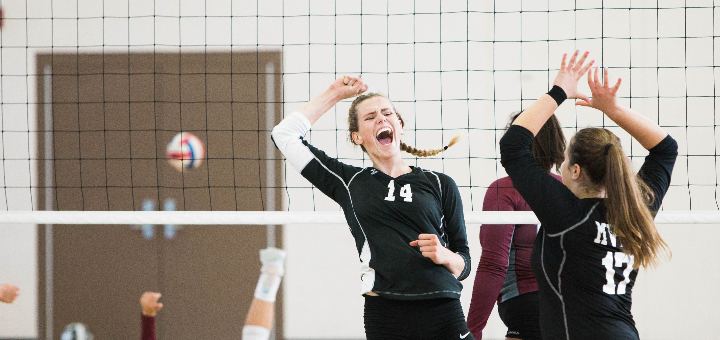
 Image credit: By Vince Fleming (2019), Unsplash.com, CC0/PD[/caption]
Image credit: By Vince Fleming (2019), Unsplash.com, CC0/PD[/caption]
There comes a time when our children have to experience the feelings of failure. When they learn that they aren’t the shining star, the world doesn’t revolve around them, and someone else’s efforts are going to be bigger and better than theirs. As parents we know our kids need that experience but its not always the most comforting to go through, especially when we have to sit on the sidelines and watch it happen. Recently, my 14 and 11-year-old daughters have entered into the world of competitive travel volleyball. It’s been a great experience for both of them, pushing them to new challenges and opening them up to skills they didn’t know existed. Both of my daughters play on the same team, and my 11-year-old is the youngest among 13- and 14-year-old girls. Being the youngest on the team hasn’t really been the problem. Her teammates like her, and she’s capable of keeping up with the plays and skill development. The problem is that her role as a player has changed. She’s always defined herself as the “athlete in the family.” Being the youngest on the team has also meant that she doesn’t get the most play time and for her this hasn’t been the easiest adjustment. She’s used to the limelight, the praise, and being “the best” among her peers. You might say she feels a loss of identity at no longer being the highest skilled player on the team. My 14-year-old, on the other hand, loves volleyball but has a different attitude. She does it for fun, but doesn’t identify with sports as a means of knowing who she is. If she doesn’t shine as the strongest player, she doesn’t let it get to her. With this new revelation of not “being the best,” my 11-year-old brings her nerves on the court. She tightens up and treats each play as if it’s a moment to prove herself. In doing so, she second-guesses her abilities, and it ends up sabotaging her efforts. Her attitude and the way she views volleyball has drastically changed. One day after a game, I pulled her to the side and said, “I noticed you’re not having a good time out there.” She looked at me and said, “I’m not very good. My coach never plays me.” The heartache I felt for her in that moment was unbearable. It’s hard to see your own children when they feel that doubt and lack of self-worth. I knew that she would take it personally and take to heart the minor mistakes. The momma bear in me wanted to march over to the coach, jump in, take charge, and ask why she didn’t have enough play time, but that wouldn’t really solve the problem. All that would really do is make problems between her and her coach and make me look like an erratic parent. Besides, the real problem wasn’t the coach, and wasn’t my daughter’s abilities. She wasn’t loving the sport. Two thoughts occurred to me that I knew she hadn’t asked herself. I looked at her and said, “Are you having fun? Are you being the best teammate?” “It’s not very fun,” she said. “I keep missing the ball, so how can I be the best?” What I realized was my daughter associated fun with personal glory and being the most talented. She heard the word "best," but not the word "teammate." While she was friendly with her teammates she didn’t see her own role as a teammate. Her definition of being the best wasn’t fully developed. In that moment I dragged her out of her own self-pity and replied, “If you want to be the best, then be the best. But be the best cheerer from the sideline, have the best attitude on the court, be the best supporter when a play doesn’t go right, be the best at having fun. Don’t do it for yourself; do it for your team.” In a nutshell, I continued to remind her that her own skill didn’t make or break the team, but her attitude could heavily affect it.Trust in the LORD with all your heart, on your own intelligence do not rely; In all your ways be mindful of him, and he will make straight your paths. Proverbs 3: 5-6
Do nothing out of selfishness or out of vainglory; rather, humbly regard others as more important than yourselves. (Philippians 2:3)As a result, my daughter had to learn how to be a team player … a real team player. As the cliché goes. “there’s no I in TEAM.” She had to learn that being the best was much bigger than her own skill. A team player focuses on the team rather than her own personal ambitions. One girl doesn’t win or lose the game. It takes 25 points to win, and one person can’t do it alone. After that talk, she switched her attitude and started having fun. She was the best supporter of her teammates, she was the most focused at practice, and she changed her attitude and tried to take criticism less personally and learn how her skill could help the team. As a result, she started getting more play time and her whole demeanor changed on the court. There are still others on her team that have stronger skill and abilities, but her version of being the best changed and it made all the difference for her and her team mates. So what’s the lesson in “being the best”? We have to teach our children a new definition and realize that being the best doesn’t mean getting the glory. Being the best doesn’t depend on our child’s skill either, but being the best does come down to being the best version of ourselves. It's only then that we truly succeed. How can you teach your kids the of what being the best means? Share your comments below.
Copyright 2020 Andrea Bear
About the Author

Andrea Bear
Andrea Bear is a wife, mom, and teacher in Stockton, California. In addition to CatholicMom.com, she also writes for HerLife Magazine and Catholic Stand. She recently completed her debut novel, Grieving Daughters Club. When she's not writing or taking her kids to volleyball practice you can find her sipping coffee from the neighborhood coffee establishments or tasting wine from the local vineyards. Visit AndreaBearAuthor.com.


.png?width=1806&height=731&name=CatholicMom_hcfm_logo1_pos_871c_2728c%20(002).png)
Comments